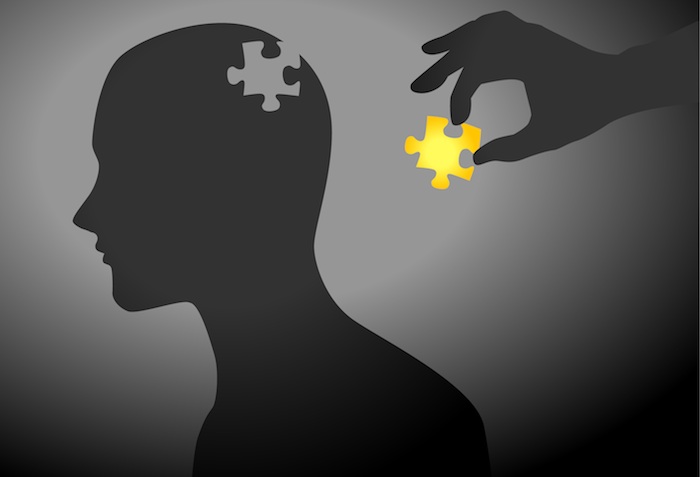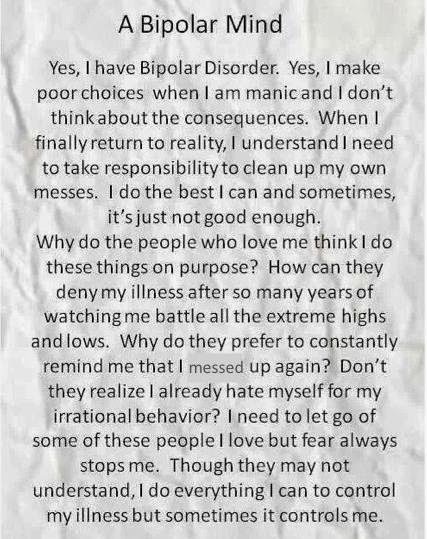You write:
Okay. Good questions. Here are some answers.
Why do these people who love me think I do these things on purpose? There are people who love you who don't understand your illness, or don't even know you have an illness. Yes, those people think you are doing it on purpose.
But then there are people who love you who DO understand your illness. They understand you are not doing it on purpose. But it isn't easy to understand.
You certainly look like you do these things on purpose. You plan. You talk about it. You are enthused about it. It's really difficult for us to believe that you are under the control of your illness. You want these things, right? You want them and it has nothing to do with your illness, right? Tell us.
But you can't have it both ways. You are making a choice to spend you life this way, or you are NOT in control and "can't help" what you are doing.
Because it looks like you are in control and know damn well what you are doing, but when it all crashes in on you, you are setting it up so you can blame the illness.
Here's an idea: don't take responsibility after the bad things happen. Take responsibility now, before they happen, and then stop them from happening. And if you need help, say something. But don't write "I do everything to control my illness" if you don't even seek help from those who are willing and able to help.
How can they deny my illness after so many years of watching me battle all the extreme highs and lows?i
I'm not sure who you think is denying your illness these past few months. If anyone has been, it has been you.
Think hard about this… who has been denying your illness?
Why do they prefer to constantly remind me that I messed up again? Not sure who is "constantly" reminding you of anything, since you've done a good job of isolating yourself from anyone who even knows you are bipolar, much less understands it.
That said, nobody I know wants to tell you that you "messed up". They just want to mitigate the damages. Put quite simply, they want to help you before things get bad for you. Is that a bad thing?
And you asked for this help. You said, after making a decision to buy a dog, "Tell me if I'm doing something stupid like that again because of my mania." That's what they are trying to do. They are not trying to make you feel bad. They don't take pleasure in seeing you "mess up" (in fact, just the opposite). They understand you don't have control. They are doing for you what you would do for them, if the roles were reversed: they are trying to help you until you get to a place where you don't need it.
Don't they realize I already hate myself for my irrational behavior?
No, they don't.
Does this surprise you?
It shouldn't.
Ask yourself this: what have you done to indicate to others that you hate yourself for your irrational behavior? Name one thing. Just one.
I'll make it easier: Forget about hating yourself — what have you said or communicated to anybody to give the impression that you know this is irrational behavior?
They may not understand, I do everything I can to control my illness but sometimes it controls me.
Try this on for size… maybe "they" DO understand. Maybe that is exactly what they think… that your illness is controlling you. Why would you want to let go of people like that? People who actually "get it" AND are trying to help?
This truly is a bipolar mind at work. People with bipolar often see the people who are helping them as people who are putting them down. That is why we caregivers are taught not to constantly ask "Are you taking your medication?" and to let the bipolar partner know that you see them as MANY things, only ONE of which is "bi-polar". Still, it's pretty hard to do and be 100% successful.
BOTTOM LINE: We are told that there is a lot of shame with being bipolar, and being the one who "messes up". We are told that helping you out increases that sense of shame, which makes it difficult to help you out. The people who love you understand all this, but they don't hold it against you. They don't think you should feel shame. They know you are trying. They know it is difficult. They know you will fail sometimes. But guess what? They are trying, too — trying to help. And helping is difficult. And they fail at it sometimes too. Help them to help you by letting them in and by not assuming that they are trying to make you feel shame or remorse or anything worse than you already do — believe me, it's the last thing they want.


